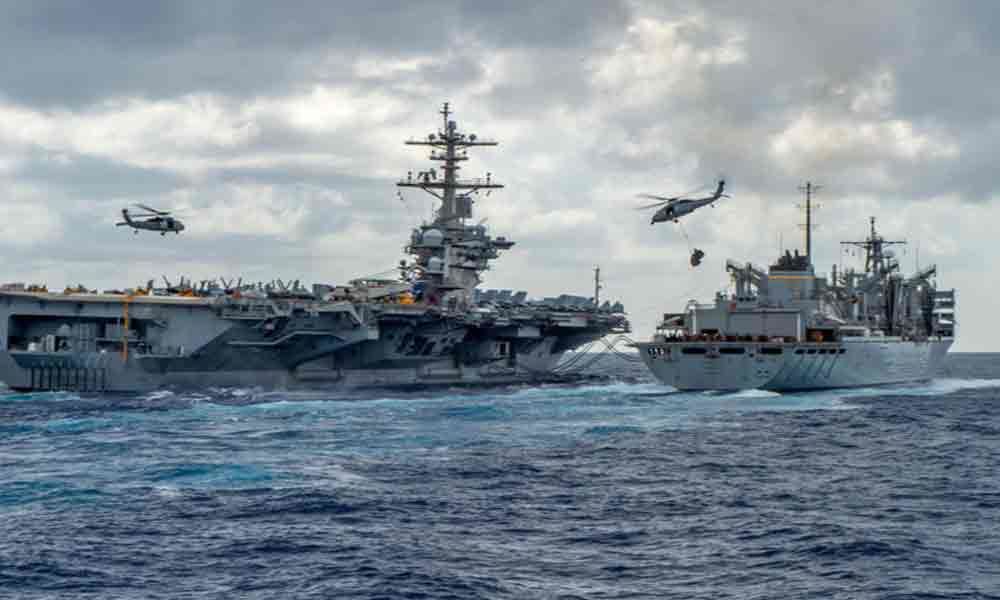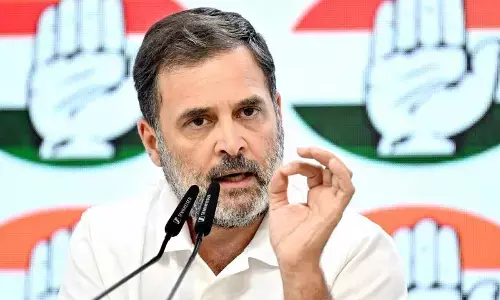US-Iran tensions: Possible aftermaths
 US-Iran tensions: Possible aftermaths
US-Iran tensions: Possible aftermathsPresident Trump signed an executive order on June 24, imposing additional economic sanctions on Iran. Apparently it is in retaliation to shooting down of the US drone by Iran over its airspace last week (which US claims to be in international airspace), which has left US red-faced, war gaming all options on the table from military retaliation to additional curbs, sanctions, talks and possibly another deal. The US claims to have exercised restraint, after ordering cyberattacks on Iranian missiles, which Iran denies to have any effect.
The immediate trigger was a strike on merchant ships, for which the US blamed Iran but Iran denied any role in it. No conclusive evidence appeared to confirm it to be a hostile act by Iran. It makes Strait of Hormuz another flash point in the global arena, more so when Iran finds support from some of the US competitors. These triggers are only a by- product of greater US agenda to 'contain/change behaviour of Iran', where Israel and Saudi Arabia are direct beneficiaries, because Iran has no capability to strike the mainland of US.
Earlier presidents like President Clinton and President Obama did not consider striking Iran as a worthwhile option, instead US worked very hard to get Joint Comprehensive Plan of Action (JCPoA) signed in 2015 with Iran (commonly known as Iran nuclear deal), even at the cost of differing with some of its allies and strategic partners.
It is a subject of discussion in hindsight, as to why President Trump found it necessary to pull out of it, and reimpose sanctions on Iran to moderate its behaviour, to help some of its allies? Did he have a better plan to achieve what the US wanted to, or it was just an election promise; hence a domestic compulsion? Has he entered a minefield by pushing Iran to the wall, from which it's not easy for both countries to retract.
JCPoA was signed to reach an end state wherein Iran gives up the means to make nuclear weapons and the US and allies agree to reduce sanctions on Iran in return. The Republicans were not too happy with JCPoA at that time and made it an election issue.
The IAEA had not reported any conclusive breach of the agreement by Iran, which implies that it was workable, with some suspicion, minor allegations and counter allegations. President Trump delivered his election promise by walking out of the deal. Additional sanctions were imposed based on the narrative of US and Israel that Iran was enriching Uranium beyond the agreed limit.
The fresh wish list of US and Israel which they want Iran to follow seems to be a tall order for any meaningful negotiations. It includes ceasing its nuclear weapons programme, uranium enrichment and nuclear capable ballistic missile systems permanently, under international verification with unqualified access to international inspectors.
It also desired Iran to pull out completely from Syria, end its support to Houthi militants in Yemen, Taliban in Afghanistan and allow disarming of Shia militants in Iraq. It also wanted Iran to cease backing Hezbollah in Lebanon, Hamas in Gaza and Palestinians.
Regime change in Iran due to economic pressure could also have been its unstated desire. With no such restrictions on Saudi Arabia, Iran refused to accept the new conditions, which it viewed as a threat to the survival of the Shia community, more so when the US is continuing to increase the military strength of its arch rival Saudi Arabia.
The rhetoric, provocative speeches, renewed sanctions and efforts to curtail their oil exports, have not worked so far. In my opinion, Iran has shown no sign to buckle under US pressure so far. People in Iran may/may not be happy with President Rouhani, but when it comes to taking an anti-America position, they will stand with him, because 'Hate America' sentiments are very strong in Iran and further economic hardship to them will make it even stronger. Will sanctions and other measures (short of war) change Iran's behaviour is questionable, if it did not do so in North Korea.
US will like to step up economic, diplomatic and information warfare to include electronic and cyber war. The sabre rattling may not end up in conventional war. The US has past experience of starting a conflict in the Middle East, but later finding conflict termination difficult, leading to more chaos. With such bitter experience it may not start it again.
Iran is not a threat to its mainland; hence during the run-up for election, President Trump may not like to get entangled in one more flashpoint for someone else, besides North Korea, South China Sea and ongoing trade war with China.
The war will push an alliance of China, Russia, Iran, North Korea and Pakistan, besides creating a problem of strategic balancing for its allies/strategic partners. The rhetoric will soon be seen following a US-North Korean downward curve.
The Iranian actions also seem to indicate impatience. Even if Iran feels that it been pushed to the wall, I see no justification in threatening the world with 60 days ultimatum to commence dangerous level of enrichment, if the deal is not protected by then.
It seems to be an over-reaction, when other partners of the deal like EU have not walked out of it and criticised US action. The economic strangulation of Iran may not work, if China and some other countries defy sanctions and start questioning the efficacy of CAATSA being US centric, at the cost of some of the core interests of other countries like energy security.
A disturbed Gulf region and Strait of Hormuz have affected the global oil flow adversely, and the most affected countries are China, India and Japan. The threatened air space has increased the distance of all the commercial flights, earlier routed over this region, resulting in extra fuel consumption and time delays.
Although the events may be like music to Israel and Saudi Arabia, it may alter the balance of alleged Shia-Sunni terror proxy by increasing regional influence of Saudi Arabia, which will further increase the instability in the region.
President Trump's idea of prioritising US military hardware sale to Saudi Arabia over further probe into Washington Post columnist Jamal Khashoggi's murder will embolden Saudi Arabia. The rise in oil prices resulting further downslide in global economy will be a natural outcome. These side-effects of sanctions make Iran different from the effects of sanctions on North Korea in near similar circumstances.
India imports 84 per cent of its crude oil requirement. Iran had been the third largest supplier of crude to India. The crude oil supplied by Iran was the cheapest for India, as Iran had agreed to accept payment in rupee terms. Any alternate arrangement will force India to buy oil in dollar terms, causing a heavy drain in foreign exchange, pushing the oil prices up. Most refineries in India are designed to refine crude from Gulf countries.
India does not have enough refineries for US shale oil; hence it will have to be purchased at a much higher cost and that too in dollar terms, which will push the cost of oil products even more, which will be a challenge for India.
These incidents will affect Indian investment in Chahbahar port of Iran adversely. The development of International North-South Transport Corridor (INSTC) linking India with CAR countries and Russia will be adversely affected by the US sanctions. The commercial traffic to Afghanistan and beyond through INSTC will also be affected by instability in Iran, more so when Afghanistan is also not peaceful. The Indian Diaspora in Gulf region will also be insecure, which will be a cause of concern for India in context of their safety and revenue loss of foreign exchange.
While Iran is putting up a brave front, to withstand sanctions despite heavy punishment on its economy, its ultimatum to EU and others to save the deal has not gone off well with the world community, more so when other members did not cancel JCPoA. Iran's resolve against US will be under severe test.
If US found it difficult to make North Korea surrender to its demand, then it will be as difficult in case of Iran (if not more), which has much more strategic significance/clout due to its location/size as well as oil export, impacting US allies, strategic partners and China. I do not feel that a regime change under the pressure of US sanctions can happen, nor do I anticipate a war on this issue.
Ultimately, the talks will have to be resorted to as the troubled Gulf region does not suit anybody. EU has not withdrawn from the Iran Deal so far, and I sincerely feel that compromises are possible. The Trump Administration may eventually find that the original deal was actually not as bad to achieve its strategic interests, as it was made out to be, more so when Iranian Supreme leader, Khomenei had asserted for years that Iran neither needs nor wants nuclear weapons.
-Maj Gen (Retd) S B Asthana
(The writer is a veteran Infantry General and strategic analyst. He is currently Chief Instructor of USI of India. The views expressed are personal)














